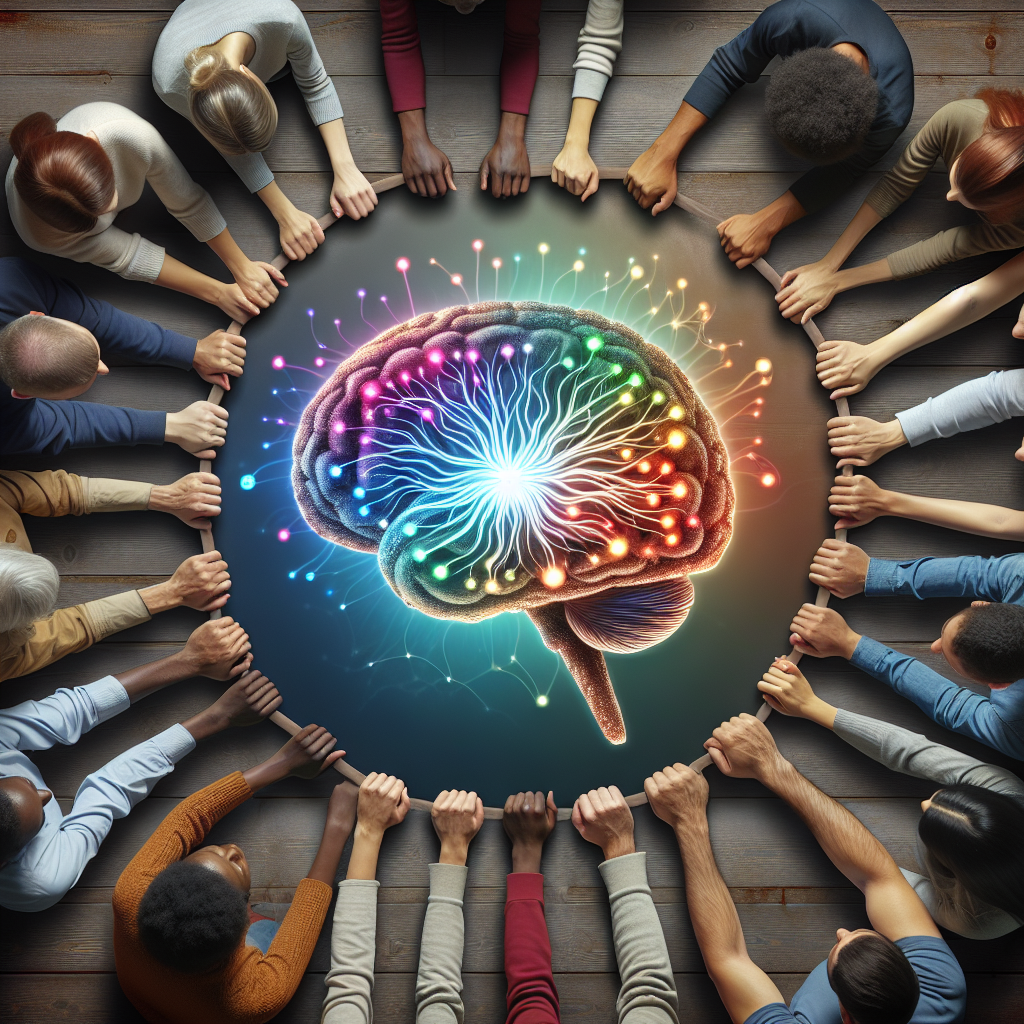
Introduction
In a world that often feels increasingly disconnected, the ability to understand and resonate with another’s feelings has never been more essential. This is the essence of empathy—a complex emotional and cognitive response that allows us to bridge the divide between ourselves and others. The Science of Empathy: Exploring Its Impact on Mental Health and Wellbeing is not just a theoretical exploration; it’s a vital inquiry into how this innate human quality can transform our personal lives and societal interactions.
The concept of empathy is not merely a buzzword; it’s backed by decades of research in psychology, neuroscience, and social sciences. As we delve into the science behind empathy, we will uncover its profound effects on mental health, relationships, and overall wellbeing. In this article, we will explore case studies, examine relevant research findings, and provide actionable insights that can help you foster empathy in your daily interactions.
What is Empathy?
At its core, empathy is the ability to perceive and feel the emotions of others. It can be broken down into two main components:
- Affective Empathy: This refers to the capacity to respond emotionally to another person’s emotional state—essentially feeling what they feel.
- Cognitive Empathy: This involves understanding another person’s perspective or emotional experience, without necessarily sharing that emotion.
Both types are crucial as they play a significant role in social interactions, emotional regulation, and mental health.
The Neuroscience Behind Empathy
Recent studies using brain imaging techniques have shown that empathy activates specific areas in the brain, such as the anterior insula and the anterior cingulate cortex. These areas are responsible for emotional awareness and regulation, which indicates that our ability to empathize is deeply rooted in our neurological architecture.
Table 1: Brain Regions Associated with Empathy
| Brain Region | Function |
|---|---|
| Anterior Insula | Emotional awareness |
| Anterior Cingulate Cortex | Emotional regulation |
| Medial Prefrontal Cortex | Perspective-taking and social cognition |
Understanding the neuroscience behind empathy highlights its biological significance, which can encourage individuals to cultivate this skill for improved mental health outcomes.
The Impact of Empathy on Mental Health
1. Reducing Anxiety and Depression
Empathy serves as a buffering mechanism against mental health issues. Research has shown that individuals with high levels of empathy tend to experience lower rates of anxiety and depression. When we empathize with others, we often share their emotional load, which can relieve individual stress and foster connection.
Case Study: The Role of Empathy in Reducing Depression
In a study conducted at the University of Michigan, researchers found that participants who engaged in empathy-building exercises reported feeling less isolated and had lower levels of depressive symptoms. The study involved activities such as active listening and sharing personal stories, leading to stronger community ties and improved mental health.
Analysis: This study exemplifies how empathy not only enhances relationships but also provides emotional support that can mitigate mental health issues.
2. Enhancing Resilience
Empathy can also enhance resilience—the ability to recover from adversity. When we cultivate empathetic relationships, we build strong support networks that can be instrumental during tough times.
Table 2: Empathy and Resilience Correlation
| Study | Findings |
|---|---|
| University of California | High empathy linked to better coping strategies |
| Yale University | Empathetic individuals reported greater life satisfaction |
This correlation suggests that empathy creates a safety net, offering both emotional support and a sense of belonging, critical components of mental resilience.
The Benefits of Empathy in Relationships
1. Fostering Communication
Strong interpersonal relationships are often rooted in effective communication, where empathy plays a pivotal role. By understanding the emotional cues of others, we can respond in a more thoughtful and caring way.
Case Study: Empathy in Couples Therapy
In therapeutic settings, couples who practiced empathy reported improved communication and greater overall satisfaction in their relationships. The use of “I” statements, active listening, and validation were common strategies used to enhance empathetic understanding.
Analysis: This case study illustrates how empathy is essential for resolving conflicts and building a deeper emotional connection between partners.
2. Strengthening Community Bonds
Empathy extends beyond personal relationships; it strengthens communities. Individuals who actively demonstrate empathy contribute to creating supportive environments, whether in workplaces, schools, or local communities.
Chart: Community Benefits of Empathy
| Benefit | Description |
|---|---|
| Increased Cooperation | Empathetic individuals are more likely to collaborate. |
| Greater Social cohesion | Empathy reduces social division and fosters unity. |
| Enhanced problem-solving | Diverse perspectives lead to innovative solutions. |
These community-wide benefits underscore the importance of promoting empathy as a foundational value.
Strategies for Cultivating Empathy
1. Active Listening
Developing the skill of active listening is foundational in cultivating empathy. This involves more than just hearing words; it requires fully engaging with the speaker, reflecting on their feelings, and responding thoughtfully.
2. Perspective-Taking
Engaging in exercises that encourage you to see the world from another person’s perspective can significantly enhance your empathetic capacity. This might involve reading literature that explores different viewpoints or discussing difficult topics with an open mind.
3. Mindfulness and Self-Awareness
Practicing mindfulness can increase emotional awareness, which is crucial for empathy. Through mindfulness, individuals can learn to recognize their own emotional states and how these affect their ability to connect with others.
The Science of Empathy: Exploring Its Real-World Applications
1. Education
In educational settings, fostering empathy among students can lead to better outcomes both academically and socially. Programs designed to teach empathy have shown improvement in student behavior, reduced bullying incidents, and enhanced peer relationships.
2. Workplace Dynamics
Empathy in the workplace cultivates a culture of kindness and respect. Companies encouraging empathy often notice increased employee satisfaction and productivity. Empathetic leadership—which prioritizes understanding team members—can lead to a more engaged workforce.
Case Study: Empathy Training at a Corporate Level
A Fortune 500 company implemented training focused on empathy development. As a result, employee turnover decreased by 20%, and satisfaction surveys indicated a stronger sense of belonging among employees.
Analysis: This reinforces the idea that empathy is not just a personal virtue but a strategic asset for organizational success.
Conclusion
The Science of Empathy: Exploring Its Impact on Mental Health and Wellbeing reveals that empathy is not merely a soft skill; it’s essential for fostering mental health, building relationships, and enhancing community dynamics. By understanding the scientific underpinnings of empathy, recognizing its benefits, and committing to its practice, individuals can improve their mental health and contribute positively to society.
In a world that often prioritizes individual achievement over communal wellbeing, choosing to cultivate empathy is a radical act of kindness. We invite you to make empathy your new normal—whether at home, at work, or in your community.
FAQs
1. What are the key types of empathy?
A: The two main types of empathy are affective empathy (feeling emotions that others feel) and cognitive empathy (understanding the emotional experiences of others).
2. How can empathy improve mental health?
A: Empathy can mitigate feelings of isolation, reduce anxiety and depression, and foster resilience through supportive relationships.
3. What practices can enhance empathy?
A: Active listening, perspective-taking, and mindfulness are effective practices for enhancing empathetic abilities.
4. Can empathy be learned?
A: Yes, empathy can be cultivated through practice and awareness. Activities focused on emotional engagement help develop this skill.
5. What role does empathy play in the workplace?
A: Empathy fosters better communication, enhances teamwork, reduces conflicts, and promotes a positive organizational culture, benefiting both employees and the company.
As we continue to explore The Science of Empathy: Exploring Its Impact on Mental Health and Wellbeing, let us remember that fostering empathy is more than a personal initiative; it’s a collective journey towards greater understanding and connection.

















